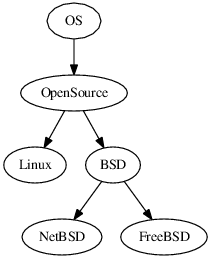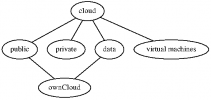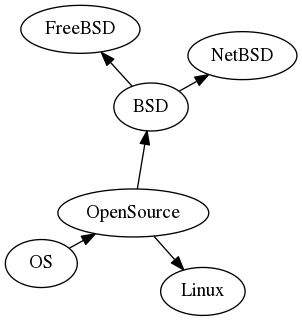Difference between revisions of "Dot"
From Linuxintro
imported>ThorstenStaerk |
m |
||
| (8 intermediate revisions by 2 users not shown) | |||
| Line 2: | Line 2: | ||
= Mindmap = | = Mindmap = | ||
| − | + | [[image:Mindmap.png|right|thumb|211px|A mindmap created by the program dot.]] | |
| − | |||
Here's how you create a mindmap with dot: | Here's how you create a mindmap with dot: | ||
'''source.txt''' | '''source.txt''' | ||
| − | |||
digraph "Wikimap" { | digraph "Wikimap" { | ||
"OS" -> "OpenSource" | "OS" -> "OpenSource" | ||
| Line 15: | Line 13: | ||
"BSD" -> "FreeBSD" | "BSD" -> "FreeBSD" | ||
} | } | ||
| − | |||
create the graphical map | create the graphical map | ||
| − | + | dot -Tpdf -o mindmap.pdf source.txt | |
| − | dot - | ||
| − | |||
view the graphical map | view the graphical map | ||
| − | + | xdg-open mindmap.pdf | |
| − | |||
| − | |||
= remove arrows = | = remove arrows = | ||
| Line 30: | Line 23: | ||
'''source.txt''' | '''source.txt''' | ||
| − | + | ||
digraph "Wikimap" { | digraph "Wikimap" { | ||
"cloud" -> "public" [arrowhead=none] | "cloud" -> "public" [arrowhead=none] | ||
| Line 39: | Line 32: | ||
"public" -> "ownCloud" [arrowhead=none] | "public" -> "ownCloud" [arrowhead=none] | ||
} | } | ||
| − | |||
create the graphical map | create the graphical map | ||
| − | + | $ dot -Tpdf -o mindmap.pdf source.txt | |
| − | $ dot - | ||
| − | |||
view the graphical map | view the graphical map | ||
| − | + | $ xdg-open mindmap.pdf | |
| − | $ | ||
| − | |||
= Layout = | = Layout = | ||
| Line 55: | Line 43: | ||
Sourcecode for the above: | Sourcecode for the above: | ||
| − | + | digraph "Wikimap" { | |
| − | digraph "Wikimap" { | + | layout=neato |
| − | + | overlap=false | |
| − | + | "OS" -> "OpenSource" | |
| − | + | "OpenSource" -> "Linux" | |
| − | + | "OpenSource" -> "BSD" | |
| − | + | "BSD" -> "NetBSD" | |
| − | + | "BSD" -> "FreeBSD" | |
| − | + | } | |
| − | } | ||
| − | |||
= See also = | = See also = | ||
Latest revision as of 06:39, 24 May 2024
Dot is a program from the graphviz package to draw graphs from the command line. It can, among other usages, be used to create MindMaps.
Contents
Mindmap
Here's how you create a mindmap with dot:
source.txt
digraph "Wikimap" {
"OS" -> "OpenSource"
"OpenSource" -> "Linux"
"OpenSource" -> "BSD"
"BSD" -> "NetBSD"
"BSD" -> "FreeBSD"
}
create the graphical map
dot -Tpdf -o mindmap.pdf source.txt
view the graphical map
xdg-open mindmap.pdf
remove arrows
Here is how you draw a mindmap without arrows, you use "arrowhead=none":
source.txt
digraph "Wikimap" {
"cloud" -> "public" [arrowhead=none]
"cloud" -> "private" [arrowhead=none]
"cloud" -> "data" [arrowhead=none]
"cloud" -> "virtual machines" [arrowhead=none]
"data" -> "ownCloud" [arrowhead=none]
"public" -> "ownCloud" [arrowhead=none]
}
create the graphical map
$ dot -Tpdf -o mindmap.pdf source.txt
view the graphical map
$ xdg-open mindmap.pdf
Layout
You can use several layouts: dot, twopi, neato and circo. Here is the neato layout:
Sourcecode for the above:
digraph "Wikimap" {
layout=neato
overlap=false
"OS" -> "OpenSource"
"OpenSource" -> "Linux"
"OpenSource" -> "BSD"
"BSD" -> "NetBSD"
"BSD" -> "FreeBSD"
}


